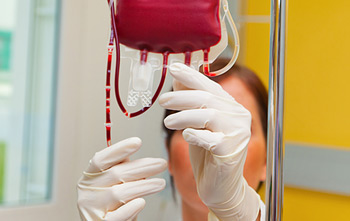
Transfusion Therapy in the Adult Patient
This course has been designed for clinicians caring for the adult patient receiving transfusion therapy. There are various blood components infused for very specific purposes, and each component requires knowledge related to that specific product. This specialized type of therapy requires advanced clinical knowledge beyond that required for the provision of general infusion therapy. Therefore, education related specifically to the administration of blood products is crucial to the safe and effective use of these components. This course will provide information necessary for administering these life saving infusions.
State Boards of Nursing have varying positions on the role of the LPN/LVN in the administration of infusion therapy, including the administration of blood products. A link to each state board of nursing is listed here. Competency requirements are obtained and maintained through the nurse’s employer, facility or institution.
In early 2024, the Infusion Nurses Society (INS), recognized as the global authority in infusion therapy, released the updated Infusion Therapy Standards of Practice. The INS sets the accepted standards for infusion therapy practice for all healthcare settings. This course is based on the current best practices as defined by the Infusion Nursing Society and other governing agencies such as the CDC, and FDA.
Questions? Check out our FAQs page and How Online IV Certification Works!
Objectives
Upon completion of this course, the participant will be able to:
- Explain the blood grouping systems and their importance in transfusion therapy.
- List available blood components and indications for each.
- Describe the activities required in preparation for transfusion.
- Identify equipment used to administer a transfusion ad it's proper usage.
- Describe the clinical management of a blood component infusion.
- Describe signs and symptoms of transfusion reactions, and appropriate interventions for each.
- Explain appropriate patient education related to transfusion therapy.
- Identify the required documentation for a blood transfusion.
Curriculum
Chapter 1: Introduction to Transfusion Therapy
- Blood Components
- ABO Blood Group System
- Rh Blood Group System
- Other Blood Group Antigens
- HLA System
Chapter 2: Whole Blood
- Description
- Indications
Chapter 3: Packed Red Blood Cells
- Description
- Indications
- Donation and Testing
- Red Blood Cell Subsets
Chapter 4: Platelets
- Description
- Indications
- Donation and Testing
- Platelet Subsets
Chapter 5: Plasma
- Description
- Indications
- Donation and Testing
Chapter 6: Granulocytes
- Description
- Indications
- Donation and Testing
Chapter 7: Clotting Factors
- Cryoprecipitate
- Factor Concentrates
Chapter 8: Pre-transfusion Activities
- Licensed Independent Prescriber Order
- Patient Consent
- Type and Crossmatch
- Vascular Access
- Baseline Vital Signs
Chapter 9: Transfusion Administration
- Component Transport and Storage
- Equipment
- Pre-medication
- Identification
- Administration
- Monitoring
- Patient Education
- Documentation
Chapter 10: Complications
- Immune Complications
- Hemolytic Reactions
- Non-Hemolytic Reactions
- Non-immune Complications
- Infectious Complications
- Transfusion Associated Fluid Overload (TACO)
- Complications of Massive Transfusion
- California Bill 241
- Implicit Bias in Healthcare
- What is Implicit Bias?
- Implications of Implicit Bias in Healthcare
- How to Reduce Implicit Bias
Price: $48.00
Contact Hours: 4

Course Author

Pamela Clark
Pamela Clark, CRNI, is an infusion nurse with the Houston Methodist Sugar Land Hospital. She has more than 35 years of experience in infusion therapy and infusion education with both licensed nurses and patients. Her experience spans multiple infusion settings including: acute care, long-term care, home infusion, and ambulatory infusion care. She also has experience in oncology and oncology research.
Read Full BioCourse Accreditation
See our Accreditation Statements page to view our accreditation information.